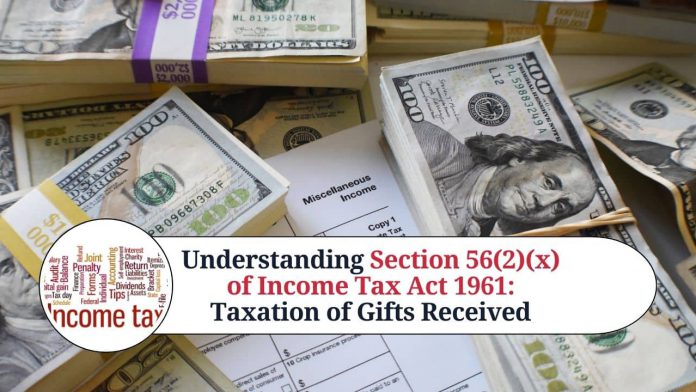The Income Tax Act, 1961, governs the taxation of income earned by individuals and entities in India. One of the provisions of the Act that has significant implications for taxpayers is Section 56(2)(x). This section deals with the taxation of gifts received by individuals and entities.
What is Section 56(2)(x)?
Section 56(2)(x) of the Income Tax Act, 1961, deals with the taxation of gifts received by individuals and entities. As per this provision, any sum of money or property received without consideration by an individual or a Hindu Undivided Family (HUF) is taxable as income from other sources. However, there are certain exemptions and provisions that are available to taxpayers.
What is the Meaning of Gifts Under Section 56(2)(x)?
Under Section 56(2)(x), a gift can be in the form of money, property, or other assets, and it should fulfill the following conditions:
- The gift must be received by an individual or an HUF.
- The gift must be received without consideration, which means that there should be no payment made in exchange for the gift.
- The gift can be received from any person, including relatives, non-relatives, individuals, and entities.
- The gift must exceed Rs. 50,000 in value in a financial year. If the value of the gift is less than Rs. 50,000, it is exempt from tax.
What are the Exemptions Available Under Section 56(2)(x)?
There are certain exemptions available to taxpayers under Section 56(2)(x). These exemptions are:
- Gifts received from relatives: Gifts received from certain relatives, such as spouse, siblings, parents, grandparents, and children, are exempt from tax. The definition of a relative under Section 56(2)(x) includes only close relatives, and gifts from other relatives are taxable.
- Gifts received on certain occasions: Gifts received on certain occasions, such as marriage, inheritance, will, and from a local authority or fund, are exempt from tax.
- Gifts received by trusts and charitable institutions: Gifts received by trusts and charitable institutions registered under Section 12AA of the Income Tax Act are exempt from tax.
- Gifts received from employers: Gifts received by employees from their employers, up to a value of Rs. 5,000 per annum, are exempt from tax.
What is the Taxation Rate Under Section 56(2)(x)?
If the gift received by an individual or HUF does not fall under any of the exemptions mentioned above, it will be taxed as income from other sources. The value of the gift will be added to the total income of the taxpayer, and the applicable tax rate will be calculated as per the income tax slab rates.
Conclusion
Section 56(2)(x) of the Income Tax Act, 1961, is an important provision that deals with the taxation of gifts received by individuals and entities. It is important for taxpayers to understand the conditions and exemptions available under this section to ensure compliance with the income tax laws in India. By seeking the help of a tax professional, taxpayers can ensure that they comply with the provisions of Section 56(2)(x) and avoid any penalties or legal issues related to taxation of gifts received.
Other Related Blogs: Section 144B Income Tax Act
Frequently Asked Questions (FAQs)
Q:1 What is Section 56(2)(x) of the Income Tax Act, 1961?
A: Section 56(2)(x) of the Income Tax Act deals with the taxation of gifts received by individuals and entities.
Q:2 What is the meaning of “gift” under Section 56(2)(x)?
A: A gift can be in the form of money, property, or other assets, and it should fulfill the conditions mentioned under Section 56(2)(x).
Q:3 What are the conditions that a gift should fulfill to be taxable under Section 56(2)(x)?
A: The gift must be received by an individual or an HUF without consideration, it must exceed Rs. 50,000 in value in a financial year, and it can be received from any person, including relatives, non-relatives, individuals, and entities.
Q:4 What are the exemptions available under Section 56(2)(x)?
A: The exemptions available under Section 56(2)(x) include gifts received from relatives, gifts received on certain occasions, gifts received by trusts and charitable institutions, and gifts received from employers.
Q:5 Who are considered as “relatives” under Section 56(2)(x)?
A: Relatives under Section 56(2)(x) include spouse, siblings, parents, grandparents, and children.
Q:6 What is the taxation rate under Section 56(2)(x)?
A: If the gift received by an individual or HUF does not fall under any of the exemptions mentioned above, it will be taxed as income from other sources. The applicable tax rate will be calculated as per the income tax slab rates.
Q:7 Is there any limit on the value of gifts received from employers that are exempt from tax?
A: Yes, gifts received by employees from their employers, up to a value of Rs. 5,000 per annum, are exempt from tax.
Q:8 What are the penalties for non-compliance with the provisions of Section 56(2)(x)?
A: Non-compliance with the provisions of Section 56(2)(x) can attract penalties and legal issues related to taxation of gifts received. It is advisable to seek the help of a tax professional to ensure compliance with the income tax laws in India.




















